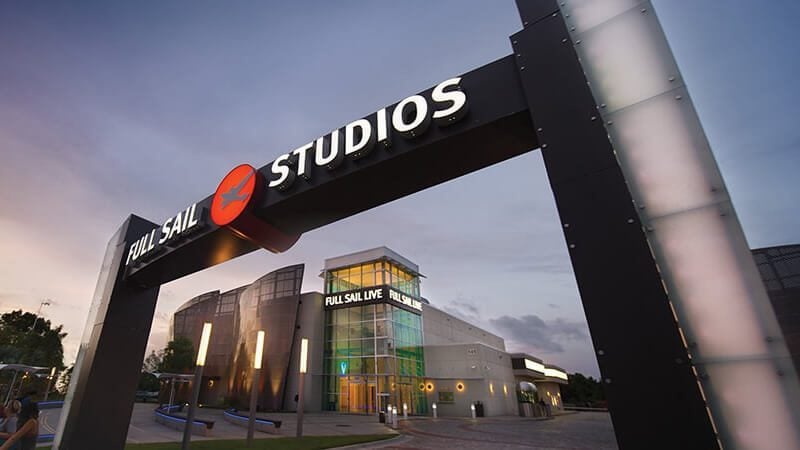Career Information
What's Your Job? Internal Search Manager
Update: In November 2018, Full Sail’s Internet Marketing programs were updated and are now Digital Marketing Bachelor’s, Digital Marketing Master’s, and Digital Marketing Certificate.
As Internal Search Manager at Walt Disney Parks and Resorts Online, it’s Adrienne Engell’s job to use the search data her team gathers to improve website content and user experience for a variety of Walt Disney Parks and Resorts web properties. We talked to the 2012 Internet Marketing master’s grad about her job, its challenges, and how students interested in a similar career path can get their foot in the door.
Full Sail: How did you get your current job as Internal Search Manager?
Adrienne Engell.: I’ve actually been working at Disney for a long time. I started out as a web developer back in 2005. [Adrienne’s undergraduate degree is in Digital Media from the University of Central Florida.] I worked as a web developer for five-and-a-half years before moving over to the search engine optimization (SEO) team for a couple of years. SEO is the more technical side of Internet marketing. I wanted to do something that would allow me to work more with the business and creative teams firsthand, and I wanted to have a bigger impact on helping improve the digital experience for our Guests.
I enrolled in the Internet Marketing master’s program at the same time I started working in the SEO department. I wanted to fill in some of the gaps I had in my skill set and become more well-rounded, so I could work on what was next for me. I landed the Internal Search Manager job about a year and a half after graduating.
FS: For someone who’s not familiar, what’s the difference between internal search and external search? Are there a lot of similarities between the two?
AF: With internal search, you’re only searching for content within a given website; external search is an Internet search, what you use engines like Google and Bing for. There’s a lot of overlap between the two: both involve a lot of data analysis, matching up keywords with content, and adding content where there might be gaps, because Guests might be searching for things that you don’t have information about. We also look at search trends like seasonality so we can see what content might be popular and determine when a marketing campaign may be most effective with a target audience.
The biggest difference is that with internal search, we have access to a lot more data, because we own what’s contained within our website. We control our own search engines and algorithms, and that ability to set our own priorities is critical.
FS: How do you use internal search data to make Disney’s websites better?
AF: From a marketing perspective, certain types of Guests are more careful decision makers and they need a high level of detail when considering a purchase. For these Guests, providing them with rich information, while still keeping it easy to understand, helps them decide and be confident in their decision. Everything we do at Disney is about creating a magical Guest experience, and that includes search on our sites. We’ll frequently look at search terms that are failing (a failed search is something that doesn’t return any results) and work with the content teams to bridge these gaps. As a result, we tend to see more interaction with the search box over time because the results are more helpful and trustworthy.
FS: What’s a typical day like for you?
AF: My role is much more about “the month” rather than “the day.” At the beginning of the month we’ll start running site reports and reviewing data. In the middle of the month, we’ll share this data and our analysis with the business units we support, and at month’s end we’ll collaborate on implementing new optimizations. Also, we’ll often get requests for custom reports on current marketing campaigns or targeted marketing segments that we are focusing on at any given time. A good example is any time we launch a major media campaign – I’ll partner with our strategists to evaluate the effectiveness of the campaign on what our Guests are searching the website for.
FS: What’s your favorite part of the job?
AF: I love that I have access to so much self-contained data. Coming from SEO, it was sometimes challenging to work in an environment where our tools were changing based on Google’s priorities rather than our own. With all of the data we have access to, we have a much greater understanding about what our Guests are searching for. Having this concrete data gives me a lot more insight when it’s time to prove a hypothesis and effect changes to our websites.
FS: What’s the most challenging part of the job?
AF: At any large company, there’s often a lot of process and coordination required to get things done. We have teams focused on creative, copy, production and more, so the challenge is making sure we’re all coordinated – but with everyone focused on delivering exceptional Guest experiences, it’s a challenge we take on together.
FS: What’s your advice for Internet Marketing students who are looking to get a job in the industry?
AF: It’s critical to have an understanding of the key metrics for the area that you want to specialize in (paid search, natural search, internal search, etc.). You have to understand why those metrics are important to a business and how they can drive results. Communication is vital, as well; you have to be able to tell a story with data. It can be very complex, but some of the partners you’ll work with may not have the time or the background you do to dive deep into every fact and figure. You need to be able to explain your findings with a graph and a couple of quick bullet points.
I’ve interviewed a number of candidates for analyst roles, and the best are those who can demonstrate their skills with portfolios of work. If you’re fresh out of school, a portfolio with your school projects could be good, but what’s even better is if you take the initiative to seek out a few small clients on your own, even if you have to take them pro bono. Google’s AdWords often has promotions for free ad credit when you spend a minimum amount [currently a $75 credit for a $25 purchase]. You could talk to one of your friends who has a website or a small business and propose a small project at a low cost. Most people would be willing to spend a few dollars to see how search might grow their business. Opportunities are out there, but it’s up to you to make it happen.
Whether you’re ready to apply or just want to learn more about Full Sail University, our Admissions Representatives are here to help. Call us or request more information.
Keep Exploring
- What's Your Job?
- Public Relations
- Before You Start
- Emerging Technologies
- International
- Warped Tour
- Career Networking Events
- Mentorship
- For Parents
- Degree Info
- Military
- Career Development
- Admissions
- Sports Marketing & Media
- Innovation & Entrepreneurship
- City Guides
- User Experience
- Student Work
- Media Communications
- Housing
- Behind the Scenes Tour

